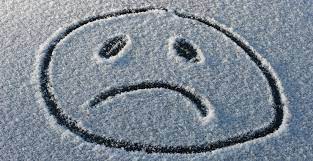Winter Blues or Depression?

The days are shorter, nights are longer and your find yourself just wanting to curl up under the covers and sleep. Is it depression or just a case of the Winter Blues?
According to the National Institute of Mental Health the culprits of melancholy during the winter months is serotonin and melatonin. Serotonin is responsible for mood regulation, which can be disrupted from the lack of activity during the cold months and lack of vitamin D due to less sunlight. Gloomy weather, limited activity outside, isolation and shorter days all contribute to our lack of enthusiasm during the winter.
However, explains Angelic Health Social Worker Philecia Howard, LSW, MSW., on the flip side, people with Seasonal Affective Disorder (SAD) are shown to have an increase in melatonin production, which is a hormone responsible for our sleep-wake cycle. “Although people may feel down with either Winter Blues or SAD due to shorter days and less sunlight in the fall and winter months, most will begin to feel better with the arrival of spring.” Seasonal Affective Disorder is a type of depression that reoccurs yearly in the fall and winter months and typically lasts four or five months. SAD symptoms are associated with major depression.
If you are concerned with your mood or lack of “Joie de vivre” you may want to pay more attention to your thoughts, feelings, and moods. “If you notice any changes due to the seasons then write them down in a notebook or a journal to help you identify any differences,” suggests Howard. “Look for symptoms, and track the length of time they occur and ask yourself, are these symptoms interfering with my ability to function in daily life? Even if you think it is “just” the “Winter Blues”, take it seriously and seek help. A mental health professional is trained to guide you with the many effective evidenced-based interventions, techniques, and tools to manage your symptoms.”
Tips to Help Beat the Winter Blues
- Take a break from social media and the news.
- Boost your mood with food by incorporating protein in your meals, foods with vitamin D such as fatty fish, fish oil and vitamin D fortified foods like milk, orange juice, and yogurt. Get your vitamin D!
- Keep up your sleep routine. Go to bed and wake up at the same time every day. Follow a simple bedtime routine that signals rest such as taking a bath, turning down the lights, or drinking a cup of herbal tea. Sleep in a cool, dark room
- Get physical! Physical activity has been shown to boost mood, decrease symptoms of depression and reduce stress.
- Get outside and seek out the sun!
- Socialize!
- Light therapy.
- Seek professional help if lifestyle modifications and other low-level interventions do not provide enough relief from the winter blues.
- Antidepressant medications as prescribed by your healthcare provider.
Symptoms of Winter Blues:
- Sadness during the fall and winter months
- Some trouble sleeping
- Lack of motivation
- Slight mood changes
- Will begin to feel better in the spring and summer months
Symptoms of major depression with winter-pattern SAD may include:
- Significant mood changes
- Low energy
- Feeling hopeless
- Loss of interest in activities
- Overeating
- Weight gain
- Difficulty concentrating
- Feeling sluggish or agitated
- Feeling depressed most of the day
- Suicidal ideations or thoughts of death
- Withdraw
- Oversleeping
